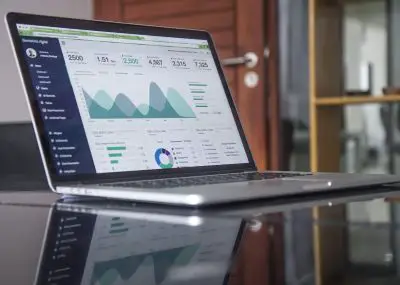Starting a Bank Account for Your Small Business
Running your own small business comes with a lot of different responsibilities: ordering supplies, administering payroll, hiring employees, etc. This is why choosing the right bank account is an important first step in keeping your finances in check.
No matter the size of your business, just you or multiple employees, it is always a good idea to keep your business and personal accounts separate. In this article, I will answer all the questions you may have about choosing the right bank account for your small business.
What kind of bank account is best for a small business? A business checking account is the best place to start for your small business finances. Business bank accounts make it easier for you to spot paid bills, expenses, payments received, etc. without having to sort through your statements. These accounts also help you establish business credit which can help you expand down the road.
Opposite what many people believe, there is not a one-size-fits-all solution. While you do want the business checking account, you still need to consider other factors when choosing the bank to hold your accounts. Let’s explore what makes a business checking account different and why it is the best choice for your small business.

Why A Business Checking Account?
The main difference between a personal checking account and a business checking account is the intended purpose for each. Your business checking account will be the primary destination for all of your company’s finances. You will use it to pay invoices, employees, bills, receive payments, etc.
Personal accounts are not set up or designed with work in mind and there are some limitations to how they can be used. With personal accounts, you are not able to receive credit card payments but with a business account, you can.
Keeping these accounts separate will help you budget and monitor your savings, both for your business and for yourself.
If you happen to have some extra cash, opening a business savings account is also a great idea. The savings account can help you boost your business credit, earn interest, and maintain minimum balance requirements.
How Do You Choose a Bank for Your Business?
There are many factors to consider when choosing the right bank for your business accounts like location, customer service, local knowledge, online convenience, etc.
Each bank account will have little nuances that set them apart and the best way to choose the right one for your business is to understand your banking needs.
Here are some factors to keep in mind when looking for a bank:
- Location: These days, most financial processes are managed online and through apps – which can make it easy to monitor and keep track of. However, you may prefer to go to a physical branch. Dealing with lots of cash or building a relationship with a financial professional may have you choosing a bank account from a local branch, which can give you the best of both worlds.
- Bank Size and Tools: Small local banks have benefits that include having a personal relationship with the professionals (which could give you some wiggle room with loans and local investment advice). Large national banks have the benefits of clearly outlined policies and digital access that may be more convenient. It’s up to your preference when choosing, but be sure to work with a bank that allows you to integrate the data from your accounting software – it’s easier and more efficient.
- Cost: Business checking accounts are not always free and often have higher fees associated with them than your accounts; if you do find a checking account with no monthly fees, there is a good chance it requires a minimum balance and a certain limit on the number of transactions – you simply need to read the fine print and weigh the benefits/costs before choosing the type of account you prefer.
- Average Account Balance: Knowing what your average monthly balance will be can help you choose an account – some will require balances above a certain amount or will have limits on the number of monthly transactions you can make. By having a good idea about how your business operates, you can choose an account with the right limitations and fees associated with it.

How Do You Open Your Small Business Bank Account?
After choosing the bank that suits your needs, you’ll want to open your account as soon as possible. Luckily, this process is usually quick and easy. While certain requirements will vary from bank to bank, most will require personal information and business information.
Typically you should bring a social security number, mailing address, personal ID such as your driver’s license or passport, as well as your business’ name, address, and documentation to prove you are the company owner.
Depending on the institution, you may be required to make a deposit when you open the account, but it doesn’t have to be huge. You should note that banks prefer and sometimes reward accounts with higher balances, but you can often open your account with less than $100.
Opening a business account is much like a personal one, you simply have to decide which bank and what kind of account you want. Some banks will offer sign-up bonuses, which can be a great perk, but make sure that it’s the kind of account you want and one that will work for your business in the long run.
Managing Your Small Business’ Finances
Several things go into managing your small business, and maintaining the finances is probably the most important. Educating yourself on accounting tasks, applying for loans, drafting financial statements, tracking your finances throughout the year, etc. is the best way to create a stable financial future for your business.
To stay on top of your small business’ finances, incorporate some of these tips:
- Keep Good Business Credit: to expand your business in the future by applying for loans, good business credit is essential. To get good credit and keep it, pay off your debt funding as soon as possible, don’t let your credit cards run a balance for more than a few weeks, don’t take out loans with interest rates you can’t pay – look for funding that you can quickly and easily repay.
- Apply For Loans: loans with reasonable interest rates are good for your business – they help you gain capital that allows you to purchase equipment and real estate, grow your team, boost your cash flow – just do your research to find the right loan and have a plan to pay it off.
- Invest in Your Business: one of the ways you can ensure long-term success for your business is to think about the future; set aside money and look into new growth opportunities – it not only shows your employees you are investing in the company and their careers, but it also gives the business more value.
- Establish Good Financial Habits: setting aside time every week or month to review the books, update your financial information, check in on investments and loan balances, etc. are all important habits that will help you stay on top of your finances and help you catch any problems before they become too big to handle.
These tips will help you get started. However, there are always more things you can do to help manage your business’ funds. Ultimately, don’t bite off more than you can chew, plan for the future, and dedicate time to review everything regularly.

Related Questions
Are Credit Unions Better Than Banks?
Credit unions are typically community-based, nonprofit organizations. This can be a great option for you if you are planning to stay local and connect with the community. You will need to become a member of a credit union, but their services are very much like a bank. Credit unions will offer loans and provide checking and saving accounts, they also may be more convenient and helpful to you.
Choosing between a credit union and a bank is ultimately up to your personal preference, but you should do your research. Some loans from credit unions may have higher interest rates than a bank. However, the interest rate on your savings account could be higher with a credit union.
You just need to decide what kind of relationship you want to have with your bank, what is more convenient, and what will benefit your business in the long run.
What Do You Need to Know to Open Your Small Business?
The best way to prepare to open your own business is to create an in-depth business plan. This plan should cover expected expenses, projected cash flow, goals for the first/second/third/fifth year, payroll, and more. Opening a business requires a lot of thought, hopeful goals, and realistic expectations.
Most new businesses will not turn a profit for the first 2-3 years. This means financial planning like startup costs and loans is really important. Do your research and talk with a financial planner, take the time to set up a plan that will establish your business for years to come.
























